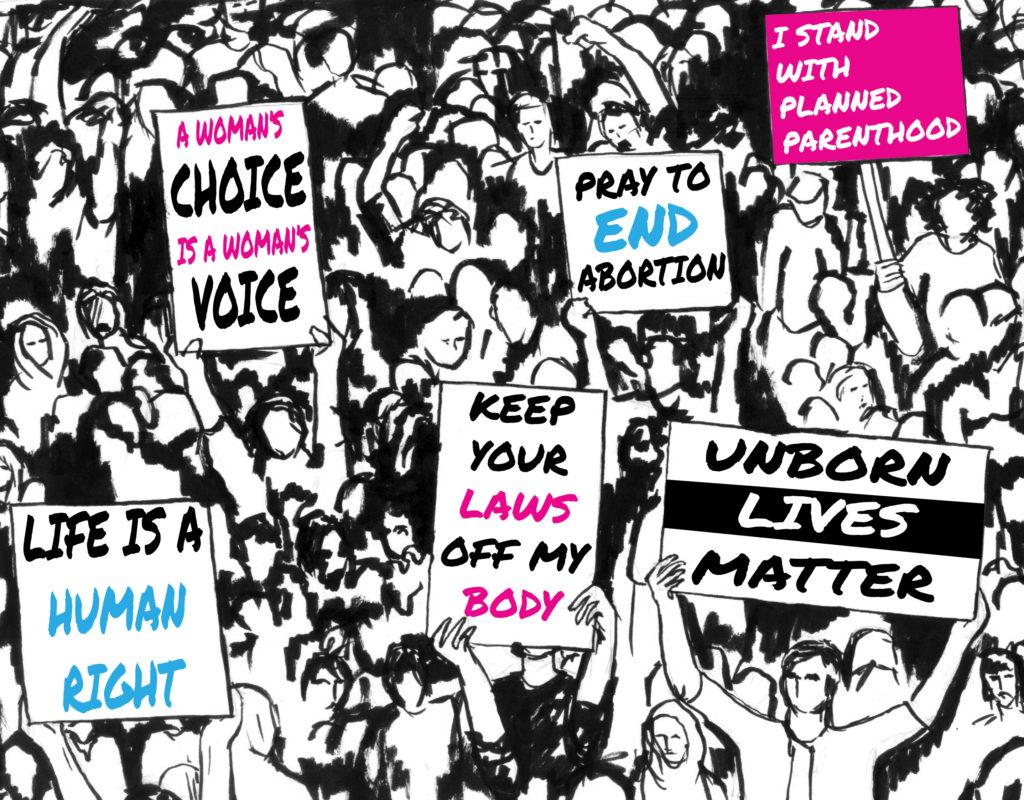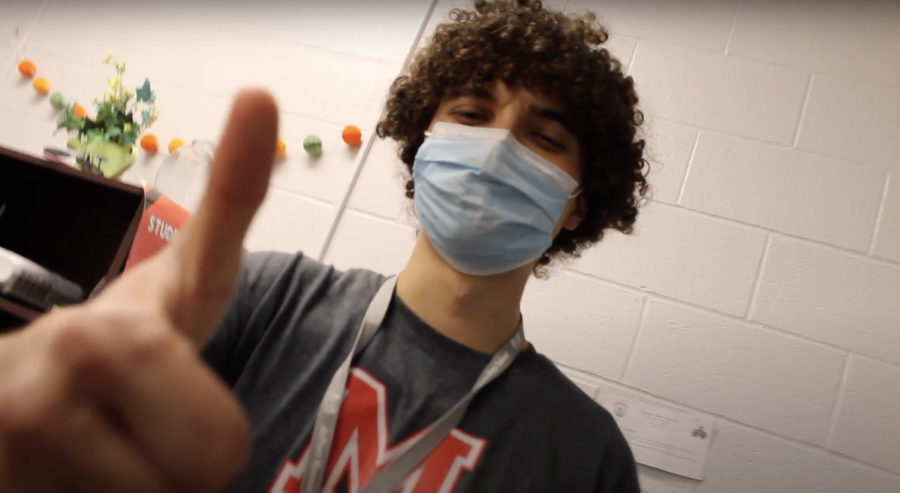Abortion — we don’t tend to talk about it unless we’re interested in rehashing the morality debate. The specifics of abortion politics can easily slide by, undetected. But over the course of this year, roughly 700,000 women in the U.S. will receive abortions. They may travel across counties, cities, or even state lines to get proper treatment. Of these women, about 18 percent will be under the age of 20. More still will consider abortion, but face too many roadblocks to follow through. Abortion is an issue that’s affecting people across our country, in our state, in our city — people our age. So we are going to talk about it — just the facts.
Between 2011 and 2014, the number of abortion clinics in the United States dropped from 1720 to 1671. That’s more than 15 clinics per year, and the decline hasn’t slowed. The current anti-abortion presidential administration is continuing to jeopardize the future of these facilities. Just this past April, President Donald Trump nullified a rule created by the Obama administration that protected Planned Parenthood and other reproductive health care clinics. Basically, he made it a lot easier for the government to pull funding from facilities that offer things like contraception, STD testing, and fertility healthcare. Now, we are feeling this hostility towards abortion rights and overall reproductive healthcare in our own state.
A little over 3,000 women in Kentucky receive abortions each year, but unlike states such as New York and California, which each have over 90 clinics, Kentucky doesn’t have many clinics for women to choose from. In fact, Kentucky only has one. The EMW Women’s Surgical Center here in Louisville is Kentucky’s sole abortion provider, and now its existence is being threatened. Louisville also has a Planned Parenthood facility with an up-to-date abortion ward. They’re just not allowed to use it. Earlier this year, the State Health Department revoked Planned Parenthood’s abortion license for the same reason that it might soon revoke the EMW’s: failure to obtain a transfer agreement.
What’s a Transfer Agreement?
A transfer agreement is a contract between an abortion clinic and a nearby hospital stating that in the case of a medical complication during an abortion, then the woman would be sent directly to that hospital. While a transfer agreement is recommended by the National Abortion Federation (NAF), it is not considered a requirement. Nevertheless, Kentucky state law requires these contracts in order for clinics to retain their licenses.
Planned Parenthood originally managed to lock down a transfer agreement with the University of Louisville hospital, but following management turnover, Planned Parenthood was unable to reach such an agreement with the new administration. After that, Planned Parenthood struggled to reach an agreement with any other hospitals. Planned Parenthood claimed that hospitals would not agree to the contract because Governor Matt Bevin threatened them with state budget cuts, but Bevin’s spokespeople denied these allegations. Currently, Planned Parenthood refers abortion patients to the EMW. The only problem now is that the EMW is facing an almost identical fight with the state over the struggle to obtain their own transfer agreement.
An Uphill Battle
About a year after Planned Parenthood’s abortion license was revoked, the Kentucky Cabinet for Health and Family Services came to the EMW with the same complaint: the clinic needed a transfer agreement or its abortion license would be terminated. The EMW promptly sued the state government on March 29, and Planned Parenthood readily joined. The intense, three-day trial began on September 6 and lasted until September 8.
The plaintiffs, the EMW and Planned Parenthood, argued that Kentucky needs easily accessible abortion clinics, because many women do not have adequate transportation, monetary means, or time to travel to another state. The EMW passionately fought for abortion procedure access, because they believe that without it, the reproductive rights of women in Kentucky — and in the nation — would be in jeopardy.
The plaintiff also fought the transfer agreement, stating that the Kentucky law which requires it is an unnecessary burden on the facility and abortion access in general.
As Elizabeth Watson, the American Civil Liberties Union attorney representing the EMW, said, “The law already says if you go to the hospital for any reason, if you show up at an emergency room, the hospital has to treat you.” In other words, transfer agreements are simply redundant formalities.
Representatives from the plaintiff’s team allege that the real problem is not only about transfer agreements and legal contracts: it’s about female reproductive rights and Kentucky’s political and cultural views regarding abortion care.
 Kentucky Governor Matt Bevin has been clear in the past about his moral opposition to abortion, and his opinion isn’t surprising seeing as Kentucky’s population is widely conservative. The plaintiffs claim that because Bevin disagrees with abortion and has much of the state on his side, he and the state government are merely using the transfer agreements as an excuse to close down the last abortion clinic in Kentucky.
Kentucky Governor Matt Bevin has been clear in the past about his moral opposition to abortion, and his opinion isn’t surprising seeing as Kentucky’s population is widely conservative. The plaintiffs claim that because Bevin disagrees with abortion and has much of the state on his side, he and the state government are merely using the transfer agreements as an excuse to close down the last abortion clinic in Kentucky.
After being subject to these accusations for the first two trial days, the defendant, the Kentucky Cabinet for Health and Family Services, got the chance to make their case. With one witness, their portion of the trial took only a few tense hours.
The main argument behind the defense is that a transfer agreement is important in sustaining the health and safety of women who seek abortions, because an agreement can put the abortion clinic and the specified hospital on the same track, allowing the process to move faster in the case of an emergency.
The state also argued that Planned Parenthood and the EMW alike did not make a great enough effort to get a transfer agreement. Under the state’s logic, the clinics cannot be excused from this requirement, because they didn’t try hard enough to adhere to it in the first place.
In the near future, a federal judge will review the case and make a final decision. This decision will not only determine the immediate fate of Planned Parenthood and the EMW here in Louisville, but it will also dictate the state of women’s healthcare in Kentucky and throughout the nation. While the trial has largely stayed under youth’s radar, its implications are capable of altering American social ideals and threatening the existence of abortion clinics throughout the nation.
So What?
Like we said, this decline in abortion clinics isn’t a Louisville-specific issue. It’s not even a Kentucky-specific issue. Missouri, West Virginia, Wisconsin, and South Carolina are just a few examples of other states with less than five operating abortion clinics. Kentucky stands out because it is so close to having no clinics at all. Anti-abortion activists are hopeful that by the end of the trial, Kentucky will be abortion free — a shining example for other states to follow. And their hopes aren’t necessarily misplaced. After all, they have the governor’s support.
“We have a chance to lead this nation from a moral and spiritual perspective that is desperately needed,” Governor Matt Bevin said. “Kentucky will lead the way.”
But what really happens when a state loses all of its abortion clinics? Just because there’s no professional abortion provider within the state doesn’t mean women stop getting abortions. They just start having more dangerous abortions. During the time period between the 1930s and the 1960s — that is, before Roe v. Wade, the 1973 Supreme Court case in which abortion was officially legalized — an estimated 200,000 to 1.2 million woman sought out illegal abortions every year. The result? Anywhere between 200 and 2,700 abortion-related deaths per year.
Now, the number of dangerous illegal abortions have dropped drastically. In 2008, there were zero deaths due to illegal abortion in the United States according to the Center for Disease Control.
When licensed physicians perform abortions, the procedure is actually incredibly low-risk. In fact, a first-trimester abortion in facilities like Planned Parenthood’s abortion wards or the EMW is less dangerous than a routine penicillin shot. According to the Guttmacher Institute, fewer than 0.05 percent of abortions have complications.
These conflicting opinions and facts just go to show how little most of us actually know about how abortion works and the role Planned Parenthood plays, so let’s break it down.
WTF: What’re the Facts?
First, let’s talk about abortion. A lot of us are confused about the abortion process, about the risks of abortion, and about the effects that come from it. Perhaps one of the most common misconceptions about abortion is that it causes severe mental instability. Prominent anti-abortion organizations such as the American Life League, the National Right to Life Committee, and the Pro-Life Action League cite some variation of “Post Abortion Stress Syndrome” as a common effect of abortion. They list depression, nervous disorders, suicidal behavior, and abusive tendencies as side effects, but here is no reliable, unbiased evidence that affirms the existence of Post Abortion Stress Syndrome. Currently, the disorder isn’t recognized by the American Psychological and Psychiatric Associations. While abortion patients may experience anxiety or distress, most women experience these emotions before their abortion, not after. Any cases of severe post-abortion mental issues have been attributed to pre-existing conditions and other unrelated factors according to the American Psychiatric Association.
The actual abortion process can be confusing as well. It’s hard to know for sure what goes on behind operation room doors when videos and images spread on social media and protest signs are skewing the facts.
On July 26, protesters from a national, anti-abortion organization called Operation Save America (OSA) gathered around a Jumbotron outside Louisville City Hall during a weeklong protest against the EMW. They stared — some angrily, some solemnly — at the abortion video playing on the screen.
This strategy is one anti-abortion activists use often: show graphic images of abortions to tug at people’s heartstrings. The OSA protest was no different. For the entire week, people stood in Jefferson Square Park and outside the clinic itself holding signs with bloody images of dead fetuses.
“It’s been a long standing principle or tactic that’s been used in awakening people to social injustice,” said Jason Storms, OSA’s youth outreach director, as he stood in front of Louisville Metro Hall during a day of protest. “We want to show graphically and vividly the suffering and the injustice that’s taking place behind closed doors.”
In other words, they’re not just showcasing graphic images without reason. They’re showing the images to inform women of what an abortion looks like because, from the anti-abortion point of view, it’s the abortion patients who have been receiving misinformation from Planned Parenthood and other pro-abortion rights organizations.
The immediate rebuttal to these images is to say that they’re fabricated, but that’s not entirely true. According to an article in Slate Magazine, anti-abortion activists get the majority of these images from one photographer — a woman named Monica Miller who’s been taking abortion photos since 1987 — under an agreement that they won’t alter the photographs. But if the images are real, how are they a form of misinformation? Basically, even though the photos aren’t fabricated, the context for them is. Almost all of the signs that the protesters hold show late-termination, or late-term, abortions despite the fact that 89 percent of abortions occur during the first trimester of a pregnancy, before the pregnancy tissue looks like a human baby. In fact, abortions later than 20 weeks — about half-way through the second trimester — are illegal in Kentucky. When so few abortions look like the ones on the signs, labeling the images “the reality of abortion” or “the truth about Planned Parenthood” doesn’t actually provide a reality check.
Planned Parenthood’s Role
When both sides are claiming to have all the facts, it can be hard to sort out the truth. What many people don’t know is that one of Planned Parenthood’s primary missions is to provide quality, comprehensive sex education for all. Their staff includes educated professionals whose purpose is to visit schools to teach young people about puberty, anatomy, healthy relationships, consent, and sexual health. They also offer medical consultations, including STD testing, mammograms (testing for breast cancer), pap smears (testing for cervical cancer), and prostate exams (testing for prostate cancer) at a discounted rate or even for free, making it possible for anyone of any background to receive professional sexual healthcare. Planned Parenthood is now reaching more people than ever before with online health counseling as well as a slew of healthcare apps such as their Spot On Period Tracker.
Over the course of this year, nearly 2.5 million women, men, and youth will visit a Planned Parenthood location, where they will receive quality, confidential healthcare. Seventy million more will access their online healthcare presence, and 1.5 million students will be educated by a Planned Parenthood employee. There may only be one location left in Kentucky, but Planned Parenthood will continue to affect communities, schools, and homes nationwide.

















